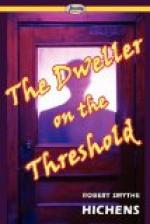“You wish very much that Chichester should resign his curacy and go entirely out of your life?” asked Malling.
“Wish!” cried Mr. Harding, almost fiercely. “Oh, the unutterable relief to me if he were to go! Even down here, away from him for a day or two, I sometimes feel released. And yet—” he paused in his walk—“I shall have to go back—I know it—sooner than I meant to, very soon.”
He spoke with profound conviction.
“Chichester will mean me to go back, and I shall not be able to stay.”
“And yet you say it has occurred to you that possibly Chichester may be as anxious as yourself to break away from the strange condition of things you have described to me.”
“Have you,” exclaimed Mr. Harding—“have you some reason to believe Chichester has ever contemplated departure?”
Malling moved slowly on, and the rector was forced to accompany him.
“It has occurred to me,” he said, evading the point, “that possibly Henry Chichester might be induced to go out of your life.”
“Never by me! I should never have the strength
to attempt compulsion with
Chichester.”
“Some one else might tackle him.”
“Who?” cried out Mr. Harding.
“Some man with authority.”
“Do you mean ecclesiastical authority?”
“Oh, dear, no! I was thinking of a man like, say, Professor Stepton.”
As Malling spoke, a curious figure seemed almost to dawn upon them, sidewise, becoming visible gently in the darkness; a short man, with hanging arms, a head poked forward, as if in sharp inquiry, and rather shambling legs, round which hung loosely a pair of very baggy, light trousers.
“And here is the professor!” said Malling, stopping short.
IX
That night when, very late, Mr. Harding and Malling returned to the red doll’s house and let themselves into it with a latch-key, they found lying upon the table in the little hall a brown envelop.
“A telegram!” said the rector.
He took it into his hand and read the name on the envelop.
“It’s for me. Malling, do you know whom this telegram is from?”
“How can I, or you, for that matter?”
“It is from Henry Chichester, and it is to recall me to London.”
“It may be so.”
“It is so. Open it for me.”
Malling took the telegram from him and tore it open, while he sat heavily down by the table.
“Please return if possible difficulties in the parish Benyon ill need your presence Chichester.”
Malling looked down at the rector.
“You see!” Mr. Harding said slowly.
“What do you mean to do?”
Mr. Harding got up from his chair with an effort like that of a weary man.
“I wonder where the railway-guide is?” he said. “Excuse me for a moment, Mr. Malling.”




